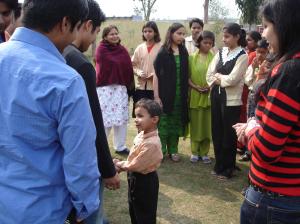Benefits of play school: Learning
Most parents give their children plenty of attention in terms of looking after their basic needs and showering them with toys to entertain them. In play schools, however, children are provided with the ‘right’ toys, i.e. those appropriate to their stage of development. Also, their play is guided so that it becomes a learning experience. The ideas is that children should transfer play behaviors such as feeding a doll, changing its clothes, etc. to themselves, and thus develop self-help skills. The thinking is that if a child can go through the motions of feeding a doll, it will soon learn to feed itself.
Play schools also teach children to recognize their own possessions. Soon a child will learn to identify his schoolbag, learn the mealtime routine that involves opening a lunchbox, folding a napkin and putting everything back after the meal is over and so on. Now this may not seem like a great achievement, but by the standards of toddler behavior, it is. Children are not born with these skills, they have to develop them. And this is where the play school steps in to help parents out. Another advantage Dr. Mehrotra pointed out is that a child’s language skills develop faster as they interact with many children of their own age and a little older.
Benefits of play school: Free Play
Lata Gupta enrolled her 1year and ten-month-old daughter in a play school for about six months. She described the school as an open room full of toys and with two supervisors. “Initially, the mothers were allowed to sit inside, but we were advised that if we had a good maid, it would be good enough if she waited outside. The children are not forced to do anything. They can play with any of the toys as they wish. For instance, if they are playing with a train, the teachers will sing a song about a train with actions.”
When asked if she felt that her daughter had benefited from the experience she said, “I think play school definitely helped my daughter. She became used to the idea of being away from home for a couple of hours a day. She became more talkative and started interacting much more. Initially, when I used to play nursery rhymes for her she would ask me to switch it off. She preferred Hindi film music. Now, she enjoys listening to cassettes of nursery rhymes because they are familiar to her.”
Benefits of play school: Reduces Separation Anxiety
Play schools prepare children for their entry into formal school. The first day of school can be quite traumatic for a child. Suddenly, he is thrust into a strange world from the warm cocoon that is home. At the age of three or four when the child goes to school for the first time, a lot is expected of him. Bawling children, clinging to their parents on the first day of school is a common sight. In Dr. Mehrotra’s opinion, play school helps minimize separation anxiety. She feels that play schools prepare children to face the world, as they are more self-confident and independent, they have improved interpersonal skills and better vocabulary.
Benefits of play school: Meeting other Parents
Children are not the only ones who benefit from play schools. They provide parents with an external support system in terms of enhancing the child’s developmental skills. In addition, parents get an opportunity to interact with other parents and keep in touch with different approaches to parenting. Parents also have a chance to observe other children and thus have a point of reference for judging their own child’s behavior. Parents can approach the trained supervisors for advice if they are facing any problems with their child at home. In other words, play schools widen parenting horizons.
Are play schools a necessity?
Many parents feel that all these skills will develop in their children any way, maybe not as quickly as with play school experience, but then what’s the hurry? Sonea Vasunia did not feel the need to put either of her daughters into a play school. She says, “I think play schools are just money-making schemes that are convenient places for working mothers to keep their children for a few hours a day. I feel that children are under so much pressure today that there is no need to channelize even their free time.” She feels that they should be allowed to enjoy their time the way that they like. In her opinion, if a mother is a housewife and spends enough time with her children, there is no need for a play school. What about separation anxiety? Mrs. Vasunia feels that this can easily be overcome if mothers were permitted to sit in the classrooms for the first few days of nursery school just to ease their children into the school routine.





